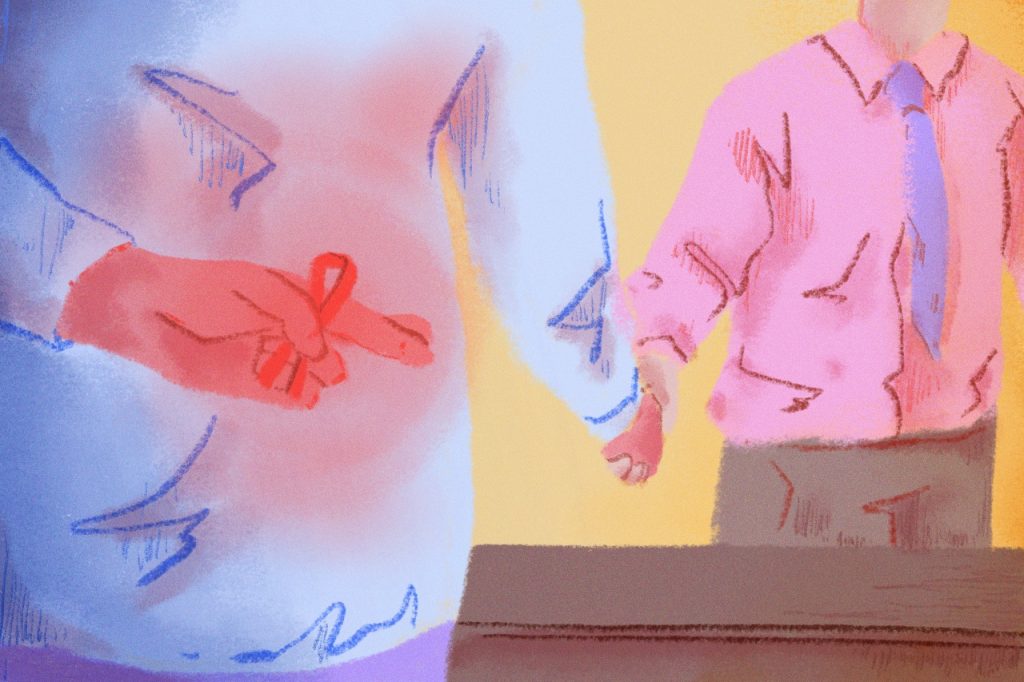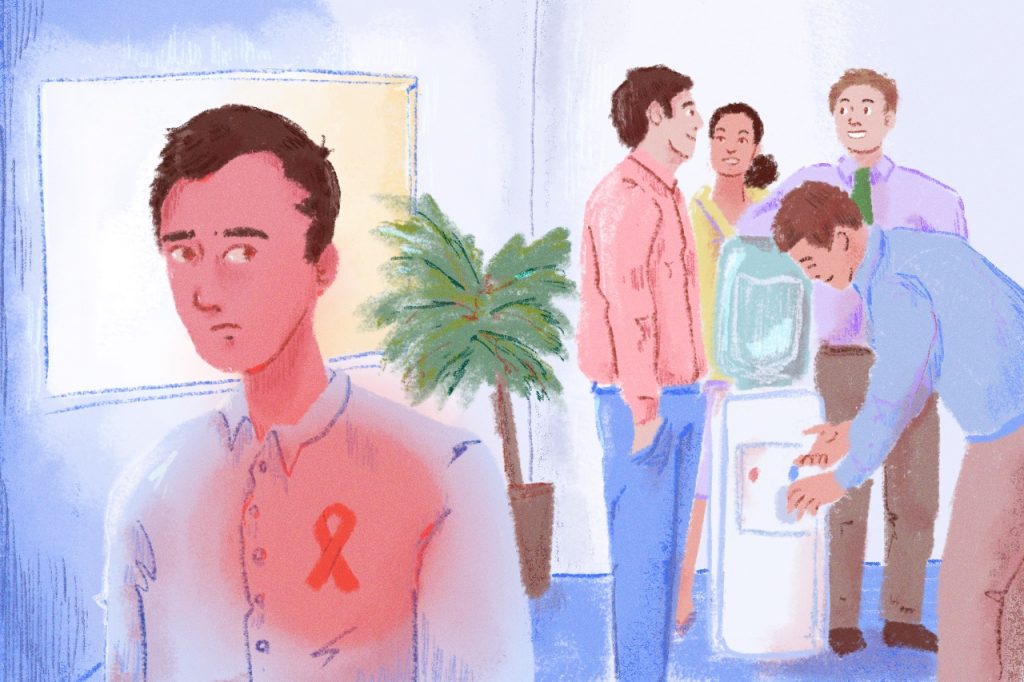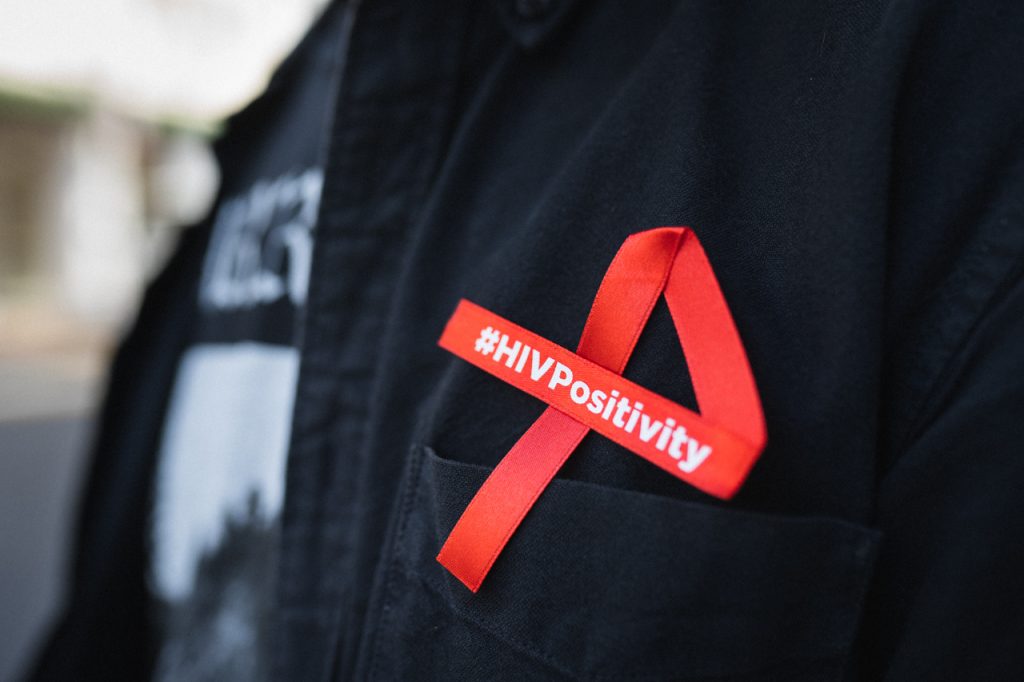All illustrations by Ansh for RICE Media
It took four years before Tim* found the courage to tell his friends and family he was diagnosed with human immunodeficiency virus (HIV).
It took even longer before he felt comfortable enough to inform his current employer.
Even then, he didn’t exactly disclose it because he wanted to. If he could have had it any other way, he probably would’ve kept mum about his status of being a person living with HIV (PLHIV).
And who can blame him? Public sentiment in Singapore has not moved past the fear and prejudice associated with the early days of the virus back in the 1980s.
While the physical condition can be managed well with treatment, the way others view PLHIV after learning of their HIV positive status often creates a social stigma that is much harder to endure.
With a long sigh, Tim says: “When it comes to career issues such as interviews, reviews and promotion, you don’t know if you weren’t given the same opportunity as others because your merits weren’t good enough, or because you have HIV.”
Sorry, HIV Negatives Only

Having been diagnosed over 10 years ago, he’s long resigned himself to the stigma and discrimination PLHIV still face in Singapore. By the time Tim was in his thirties, he had seen several acquaintances lose their jobs after disclosing their HIV status at the workplace.
One close friend, a waiter, was dismissed after disclosing the purpose of their medical leave to their employers — to go for their regularly scheduled HIV treatment. The official reason given for termination was that they had not declared their HIV status at the start of employment.
Another friend was told to leave their job at a long-term care facility simply because they live in the same household with a PLHIV.
It goes without saying that part of living with HIV involves a great sense of paranoia about the potential job discrimination and social stigma. Although most jobs have no reason to ask about one’s HIV status, Tim lives in anticipation that more people in his workplace might find out about his HIV positive status and things might go south from there.
The trepidation was bad enough that Tim chose to wait three years post-diagnosis before seeking treatment in Singapore since doing so would mean officially being registered on the local record. In hindsight, he wished he started treatment earlier, but back then as a young professional trying to carve a career for himself, Tim worried that he was risking everything before it even started.
As it is, he’s currently on an employment bond with a local company. He fears getting dismissed, which would mean defaulting on his bond and causing his friends (who offered to be his guarantors) to have to cough up a large sum of money.
“As much as possible, I’d do my best to avoid shaking things up. But for the sake of my mental health, I really wished there was some kind of protection for PLHIV so I don’t have to hide and be afraid of being found out.”
He eventually disclosed his status to his supervisors out of necessity — they planned on posting him to an overseas office and there was a chance he may not be allowed to work there due to his HIV status. Fortunately, his supervisors understood his concerns and didn’t let his disclosure affect their work with him.
Tim finally feels safe in his workplace, but there remains a lingering worry: How many other companies would extend the same treatment to other PLHIVs?
Staying Silent Protects, But Also Doesn’t

The toll of being in a nonconsensual closet of sorts forces PLHIV to compromise on their mental health, especially without clear workplace policies that protect employees from discrimination due to their status. That’s on top of having to deal with the emotional turmoil of living with HIV in secret.
But they would choose in a heartbeat, over and over again, to keep that part of themselves under wraps to avoid the risk of retrenchment and discrimination.
Tim puts it bluntly: “Why would I risk hurting myself [by disclosing] if I fear what the result might be?”
For some perspective, roughly 200 to 400 new cases of HIV are reported in Singapore each year. But according to the Singapore National Employers Federation (SNEF), the number of PLHIV who file reports regarding discriminatory workplace practices in a year is negligible.
While that sounds like a good statistic, SNEF’s Senior Director Jerry Seah says it’s not that simple.
Over the years, SNEF has handled some enquiries about workplace guidelines and employee rights with regards to PLHIV, but few of those that call in actually go through with filing a report against their employers.
However, Jerry notes that the prejudice PLHIV face often stems from a place of ignorance rather than a purely antagonistic one. Once properly educated on HIV and how it spreads, the employers SNEF spoke to over the years learnt how to better manage their employees to create a more progressive and inclusive workplace.
“There are a lot of myths and misconceptions surrounding HIV, and these employers may not be aware of the facts.”
Jerry recounts one particular case: “This employee’s viral load has been consistently undetectable for the past 9 years, and they had been in the company for over 10 years, but colleagues suddenly felt uncomfortable being around them the moment they found out about their HIV status.”
Those colleagues didn’t understand that HIV cannot be spread through casual contact in the everyday workplace environment. Concepts such as U equals U (undetectable = untransmittable), which explains how PLHIV can achieve an undetectable viral load with treatment and thus are unable to transmit the virus to anyone, were completely foreign to them too.
There might have also been some colleagues who, while understanding of the PLHIV’s struggles, did not know the words to say to express their support.
Providing more information to help colleagues clarify any misconceptions and better understand the condition is the first step to changing perspectives. After SNEF addressed the concerns through an educational talk, not only did the workplace transform into a much more inclusive one, but they were also able to redesign his job scope to suit him and his schedule better.
It’s the lack of conversation surrounding the topic, Jerry says, that perpetuates misconceptions in the workplace. Through the years, he’s had to field plenty of unfounded and uninformed beliefs about HIV in the companies he had to deal with: like PLHIV requiring more medical leave than the average employee, or that HIV could spread in a normal workplace setting through the sharing of common items or physical contact.
He also clarified that it is safe for PLHIV to work in high-contact positions, such as those in the F&B sector as it’s virtually impossible to transmit the virus through food, utensils, air or saliva.
Silence begets misconceptions, and the ones who suffer the most are the ones silence sought to protect.
To get the conversations going, SNEF has been conducting talks and workshops on managing HIV/AIDS at the workplace for organisations. This is part of their three-tier approach (education, support, policies) to ending stigma in the workplace for PLHIV. With proper workplace education, employers can understand the fears of prejudice faced by a PLHIV and work towards building a more inclusive working environment for folks who are no different from you and me.
While it’s difficult for PLHIV to break the silence, there’s nothing stopping the rest of us from talking about HIV. In an age where allyship is the strongest form of support we can give, spreading understanding and educating those around us to better understand HIV and U=U can aid the elimination of HIV-related stigma and discrimination in the workplace.
Guidelines Are Changing, Workplaces Are Too

To put to rest any lingering doubt, Jerry confirms: employees are not obliged to disclose their HIV status in a workplace unless explicitly required in their contract. Period.
Should they feel as though they’re at risk of involuntary disclosure or discrimination, they can always reach out to the Tripartite Alliance for Fair and Progressive Employment Practices (TAFEP) for assistance without compromising their anonymity. Meanwhile, employers who need assistance in managing the workplace for people with HIV/AIDS can contact SNEF for guidance.
As the relevant authorities and organisations step up their engagement and outreach to promote fairness in the workplace, employers are encouraged to be more open-minded and regularly check that they are not being discriminatory. Resources are widely available to assist employers on this journey of acceptance, like those found on the SNEF website.
To top that off, earlier this year the Government agreed to enshrine TAFEP’s fair employment guidelines in law to ensure workplace fairness. And as laws and guidelines are changing, so are workplaces.
Apart from the obvious benefits of destigmatisation, SNEF hopes employers can help to educate their employees to prevent the further spread of HIV. This would also encourage more individuals to get screened for HIV earlier, thus allowing more PLHIV to start on treatment as early as possible.
Today, Tim considers himself lucky to be able to disclose his status to his current supervisor without repercussions. Perhaps with more public education and time, every PLHIV would be able to do so.








